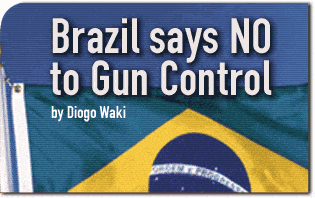 The international left was monitoring with great expectations the results of Brazil’s weekend referendum on a nationwide ban on the sale of guns and ammunition. A Yes vote would have been celebrated as a victory for gun control not only in Brazil but worldwide.
The international left was monitoring with great expectations the results of Brazil’s weekend referendum on a nationwide ban on the sale of guns and ammunition. A Yes vote would have been celebrated as a victory for gun control not only in Brazil but worldwide.
However, to the dismay of the left, the Yes vote suffered a crushing defeat. An overwhelming 63.9% of Brazilians — practically two thirds of the vote — said No to the proposed government ban.
An Overview
The controversy began in December 2003 when President Luiz Inácio Lula da Silva, despite stiff opposition, approved the Disarmament Statute as a “Christmas gift” to Brazilians. The law clashed with several constitutional clauses and required a number of procedural tricks to be approved by Congress. As a matter of fact, four lawsuits were immediately filed with the Brazilian Supreme Court to have the law overturned as unconstitutional.
However, one of the Statute’s articles made the arms and ammunition ban contingent upon approval by a nationwide referendum. The October 23 referendum marked the first time any government has put a gun ban to the vote.
Congress Calls a Referendum
In the beginning of the referendum battle, the media supported a Yes vote almost unanimously. Only rarely were gun control opponents given a chance to speak out.
It seemed that for a long time, the vast majority of Brazilians were unaware of the stakes. Five years ago, the Coalition for Legitimate Self-Defense (bringing together several hunting and sport shooting associations) started an intense effort, particularly on the Internet, to organize people to try and preserve the citizens’ legal right to bear arms. Later, other organizations joined the Coalition.
The referendum was a perfect occasion to wake up the public and show the government that the vast majority of Brazilians would not accept a ban on the sale of arms and munitions. For this end, the Coalition started holding debates and lectures for professional groups, universities, religious groups and parishes, and publishing articles in newspapers defending the right to own and bear arms for self-defense.
Free Television Time
Brazil’s electoral laws require that, in the month preceding any election, free television and media space be equally shared by opposing parties. This provision provided the greatest opportunity for conservatives to make themselves heard. Two parliamentary fronts were formed, one defending a Yes vote (misleadingly called Parliamentary Front for the Right to Life) and another supporting the No vote (Parliamentary Front for the Right to Legitimate Self-Defense). The debate, which, until then, had been limited to intellectual circles and those with greater Internet access, spread to the general population.
Brazil became divided over the issue. On the one side were the usually more conservative proponents of the right to own and bear arms. On the other side were the media, leftist politicians (Workers Party and Communist Party members, etc.) and the left wing of more centrist parties, allied with key elements of the Catholic left including many leftist bishops which publicly called upon Catholics to support the ban.
As the date approached, defenders of the No vote, plus some politicians who mustered enough courage to brave the politically correct Yes vote, intensified their action. The parliamentary front supporting the No vote put together well prepared news items with clear messages for the people. Nevertheless, the lack of proportion in strength and resources between the two camps was enormous: the Yes vote camp was like a mighty Goliath against a tiny David for the No.
Gradually, some normally leftist intellectual and artistic circles began to join the No-vote bandwagon. Public opinion appeared to be waking up from a longstanding lethargy and to realize their rights were threatened. They realized that the law would merely disarm honest citizens while criminals would remain armed and grow even stronger. This apparently was the critical moment when the situation changed and become irreversible.
Opinion polls, which had shown an overwhelming 80% in favor of the Yes vote at the time the referendum was called, now began to show a decisive shift toward the No vote. Leftist politicians fell silent, as proponents of gun control tried to minimize poll results.
On October 23, the die was cast: It was perhaps the first time Brazil had voted en masse against a government proposal. The No vote won in nearly every Brazilian state.
The hopes of the Brazilian and international left were dashed, as their gamble backfired. Disconcerted, they are now striving to explain to their grassroots what went wrong. Many gun control promoters question whether the matter will ever be discussed again. Others note that many Brazilians are now insisting on the right to bear arms – a provision not explicitly found in the Constitution.
The Day After
Today’s Brazil is a far cry from the Brazil of yesterday. A certainty has been established in public opinion that people must stand up for their rights and that, by organizing and putting up a struggle, they can accomplish their goals. Is this not the same wave of conservatism that one sees in the United States, which also echoes the No vote by France and Holland on the European Constitution? Time will tell.
Diogo Waki is São Paulo state coordinator for the Campaign for Legitimate Self-Defense.

